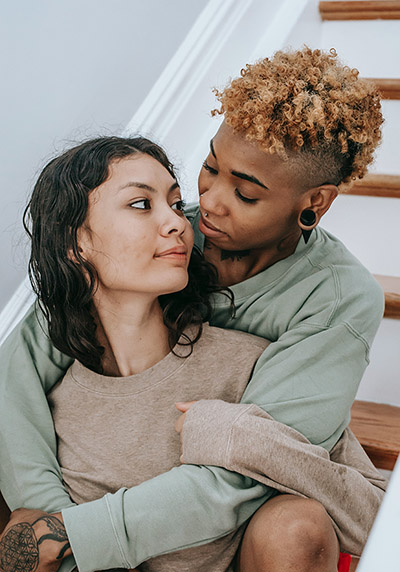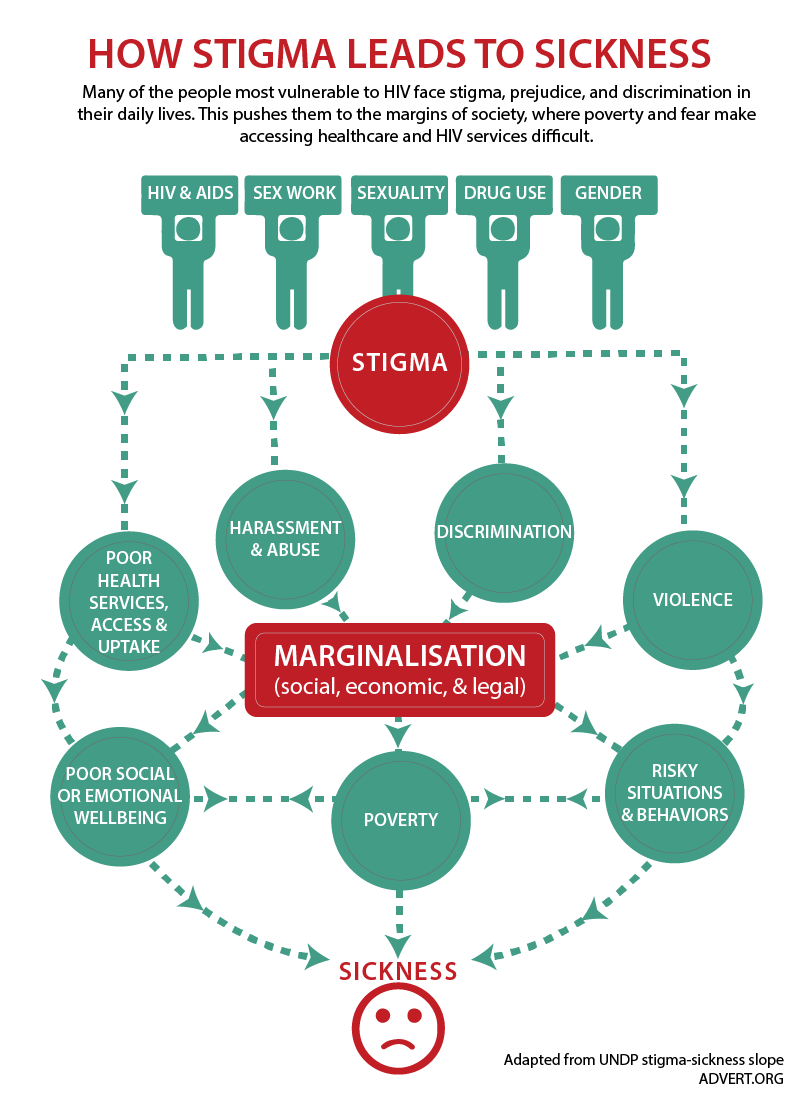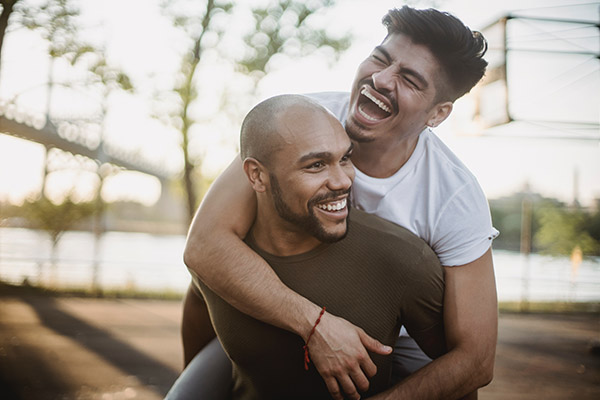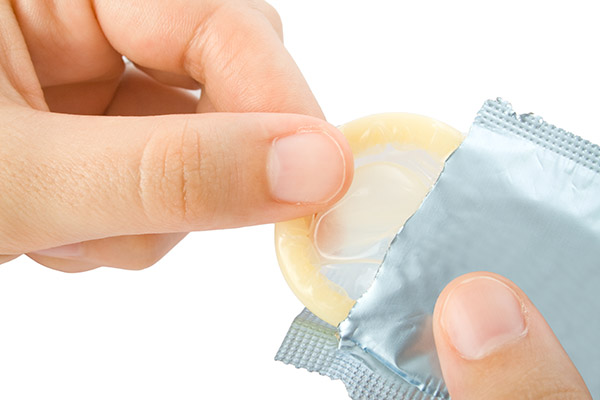
Safe Sex = Great Sex
Don’t shy away from sex. Safe sex can be great sex even if you are HIV positive. Find support – physically and emotionally. Be aware and prepared for the social stigma associated with HIV. Knowledge is power. Knowledge coupled with the support of friends and family can help break the negativity and shame associated with HIV.

Living With HIV
Millions of people have HIV — you’re definitely not alone.
Most people get at least one STD in their lifetime and having HIV or another STD is nothing to feel ashamed of or embarrassed about. It doesn’t mean you’re “dirty” or a bad person.
Finding out that you have HIV can be really upsetting. You might feel mad, embarrassed, scared, or ashamed at first. But you’ll probably feel better as time goes by — having a good support system and getting counseling really helps. There are medicines you can take to help you stay healthy, and lots of ways to avoid giving HIV to anyone you have sex with. The reality is, people with HIV can be in relationships, have sex, and live normal lives by taking a few precautions.
Although there’s no cure for HIV, there are medicines that help people with HIV live longer, healthier lives. HIV treatment called antiretroviral therapy (ART) lowers the amount of virus in your body
Remember: U=U stands for Undetectable = Untransmittable.
This means, if a person with HIV is on HIV meds (antiretroviral therapy, or ART) with a regularly undetectable HIV viral load, the virus cannot be transmitted to a sex partner.
Taking care of your emotional health is important, too. It’s a good idea to see a counselor or therapist who’s trained to help people with HIV. There are a lot of online and in-person support groups that can give you a safe place to talk about your feelings with people who understand what you’re going through.
It’s very important that you tell anyone you’re having sex with that you have HIV. It’s not the easiest conversation, but it’s an important one.
What Is HIV Stigma?
HIV stigma refers to unfair or bad attitudes, actions, and thoughts towards people living with or at risk of HIV. It can have a harmful effect on the health and well-being of people living with HIV and discouragers’ individuals from learning their HIV status, accessing treatment, or sticking with their treatment.
HIV stigma can also affect those at risk of HIV by discouraging them from seeking HIV prevention tools and testing, and from talking openly with their sex partners about safer sex options.

Populations that are more affected by HIV are often affected by stigma due to, their gender, sexual orientation, gender identity, race/ethnicity, drug use, or sex work.
HIV stigma drives acts of discrimination in all sectors of society, including health care, education, the workplace, the justice system, families, and communities.
Breaking down HIV stigma is a critical part of ending the HIV epidemic.


Sharing our Voices and Stories
The stories below give you a glimpse into lives that have been touched by HIV. They also show the power of a loved one’s support in helping to overcome stigma.
Let’s Stop HIV Together PSA: Nestor and Roseanne “They were able to see the good in me when I couldn’t see it myself.”
Let’s Stop HIV Together PSA: David and Johnny “We have faced a lot of stigma. To have Johnny’s support is immeasurable.”
Behind the Scenes with Let’s Stop HIV Together “People from all over the country are sharing their stories of how HIV stigma has touched their lives.”
What causes HIV stigma?
The lack of information and awareness combined with outdated beliefs lead people to fear getting HIV. Additionally, many people think of HIV as a disease that only certain groups get. This leads to negative value judgements about people who are living with HIV.
How do I talk with people about having HIV?
It might feel scary to admit that you have HIV but talking about things can really ease your mind.
You could lean on a close, non-judgmental friend or family member whom you trust to keep the conversation private.
Counselors and support groups can also be sources of comfort — and they can help you figure out how to talk with others about your HIV.
There’s no one right way to talk to your partners about having HIV, but here are some basic tips that might help:
- Try to stay calm and remember that you’re not the only one dealing with this. Millions of people have HIV, and plenty of them are in relationships. Try to go into the conversation with a calm, positive attitude.
- Know your HIV and AIDS facts. There are a lot of myths about HIV out there, so read up on the facts and be ready to answer your partner’s questions.
- Think about timing. Pick a time when you won’t be distracted or interrupted, and a place that’s private and relaxed. If you’re nervous, you can talk it through with a friend who knows your status or a counselor first, or practice by talking to yourself.
- Safety first. If you’re afraid that your partner might hurt you, you’re probably better off with an e-mail, text, or phone call — or in extreme cases, not telling them at all. Call 1-800-799-SAFE or go to the National Domestic Violence Hotline website for help if you think you might be in danger.
- Try not to play the blame game when you talk to your partner. If one of you tests positive during the relationship, it doesn’t automatically mean that somebody cheated. It takes a few months for HIV to show up on a test, and most people don’t have any symptoms for years.
- It’s really important to also tell your past partners that you have HIV, so they can get tested, too. A lot of health departments have programs that let your partners know they were exposed to HIV without giving them your name unless you want them to.
What do I need to know about dating with HIV?
Some people feel like their love lives are over when they find out they have HIV, but it’s just not true.
People with HIV can have fulfilling romantic and sexual relationships. People living with HIV can have relationships with partners who don’t have HIV or with partners that are also living with HIV.
HIV treatment helps keep you healthy and helps you avoid passing HIV to someone else. If your partner does not have HIV, they can also take a medicine called PrEP that can help protect them from getting HIV through sex.
It’s important to tell your sexual partners about your HIV status. That way, you and your partners can make more informed decisions about safer sex, testing, and treatment that are right for the both of you.
In 21 states, laws require people with HIV who are aware of their status to disclose their status to sex partners, and 12 states require disclosure to needle-sharing partners. For more information visit www.cdc.gov/hiv/policies/law/states/index.html
It’s normal to be worried about how your partner’s going to react. And there’s no way around it: some people might get freaked out. If that happens, try to stay calm and talk about your plan to stay healthy and how they can stay HIV negative.
It might help to give your partner a little time and space to process. You could also suggest they talk with your HIV doctor about ways to protect themselves from HIV.
If you tell someone you have HIV and they hurt you, shame you, or make you feel bad, it’s not ok. You deserve to be with someone who respects and cares about you, and there are plenty of people out there who will.

How do I avoid getting HIV during sex?
HIV is spread through contact with blood or sexual fluids, like semen and vaginal fluids, usually during vaginal and anal sex. So the only 100% certain way to avoid HIV is to not have vaginal or anal sex.
But most people do have sex at some point in their lives, so learning about HIV prevention and knowing how to have safer sex is important. Using condoms REALLY lowers your risk of getting HIV. If you’re going to have sex, using condoms every single time is the best way to protect yourself from HIV. There’s also a daily pill you can take — called PrEP — that can help prevent HIV.

Some sexual activities are safer than others when it comes to getting HIV.
These activities are “no risk” — they’ve never caused a reported case of HIV:
- masturbating
- touching your partner’s genitals
- rubbing your bodies together (dry humping)
- kissing
- having oral sex with a condom or dental dam using clean sex toys
These activities are “lower risk” — they’ve only caused a few reported cases of HIV (out of millions):
- "French” or deep kissing (if the person with HIV has sores or bleeding in their mouth)
- vaginal sex with a condom and/or PrEP
- anal sex with a condom and/or PrEP
- oral sex without a condom or dental dam

These activities are “high risk” — millions of people get HIV this way:
- vaginal sex without a condom or PrEP
- anal sex without a condom or PrEP
It’s easier for HIV to get into your body if you have sores, cuts, or openings in your skin that semen (cum), vaginal fluids, or blood may get into. So don’t have sex if you have a herpes outbreak or other infections.
Having other STDs makes you more likely to get HIV, so it’s a good idea to get tested for STDs regularly.
There’s no vaccine that protects against HIV. There are medicines called PEP and PrEP that can help prevent HIV.
If you don’t have HIV and your partner does, they can get on an HIV treatment called antiretroviral therapy (ART). ART can lower their chance of spreading HIV during sex. And some people who are on ART can’t transmit HIV to their partner at all.